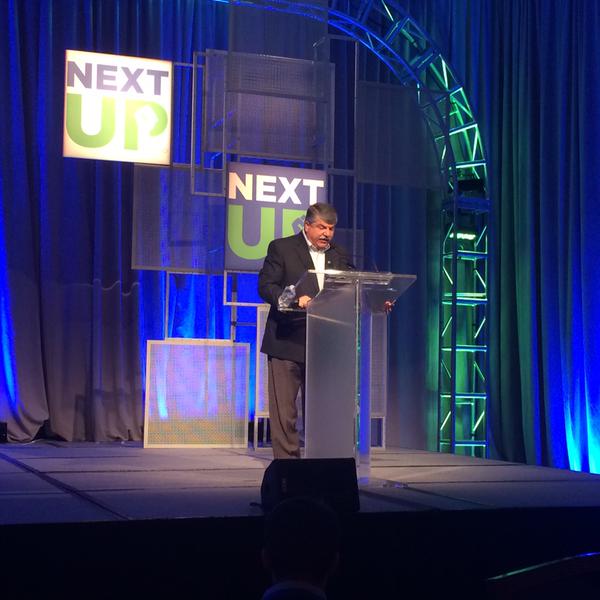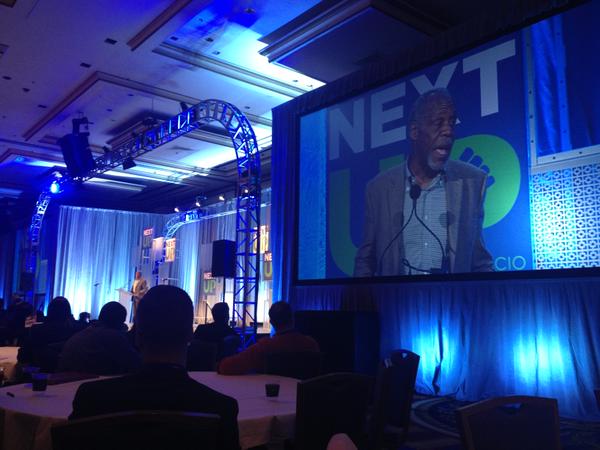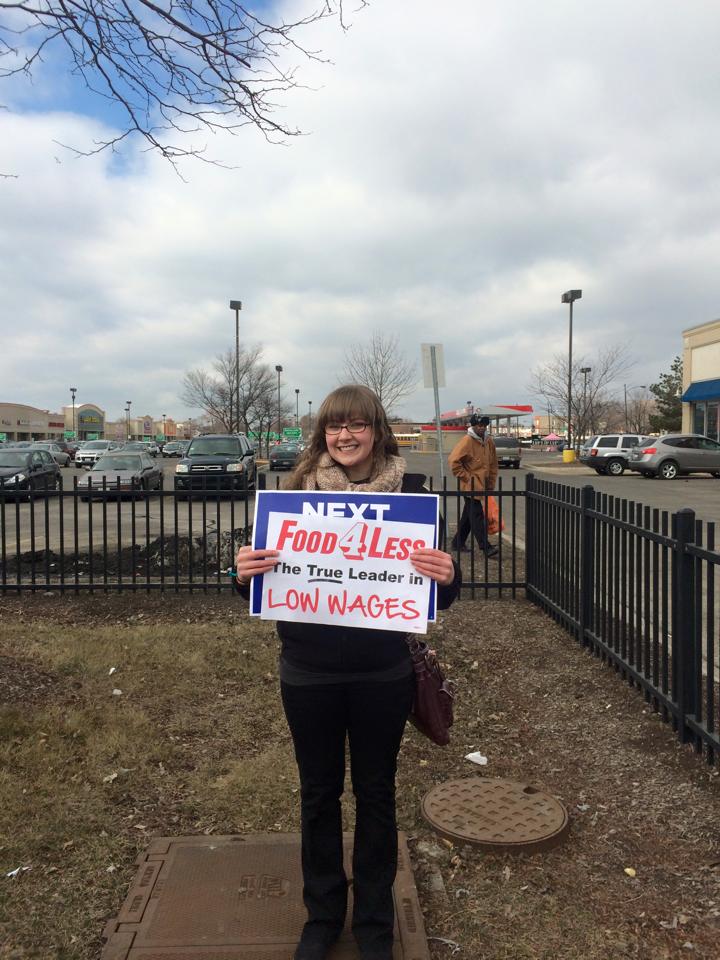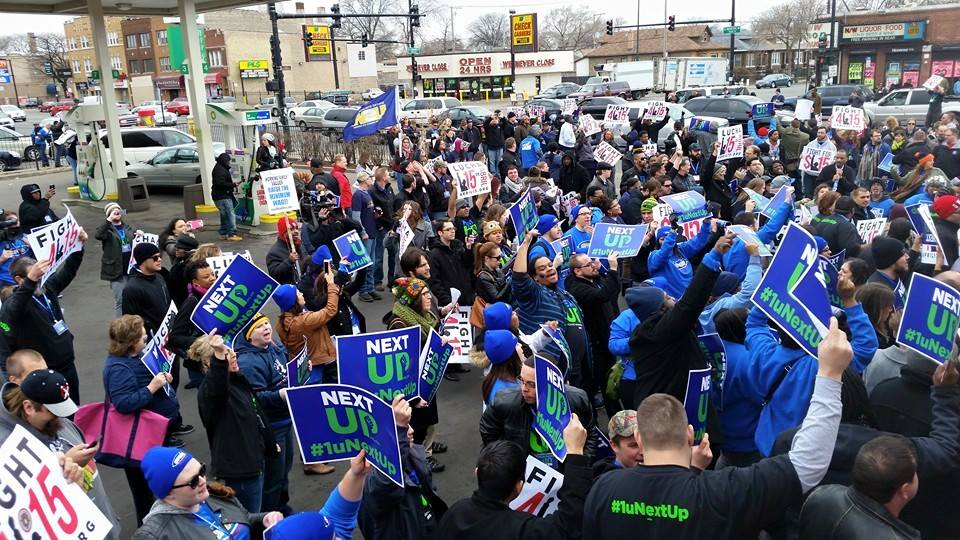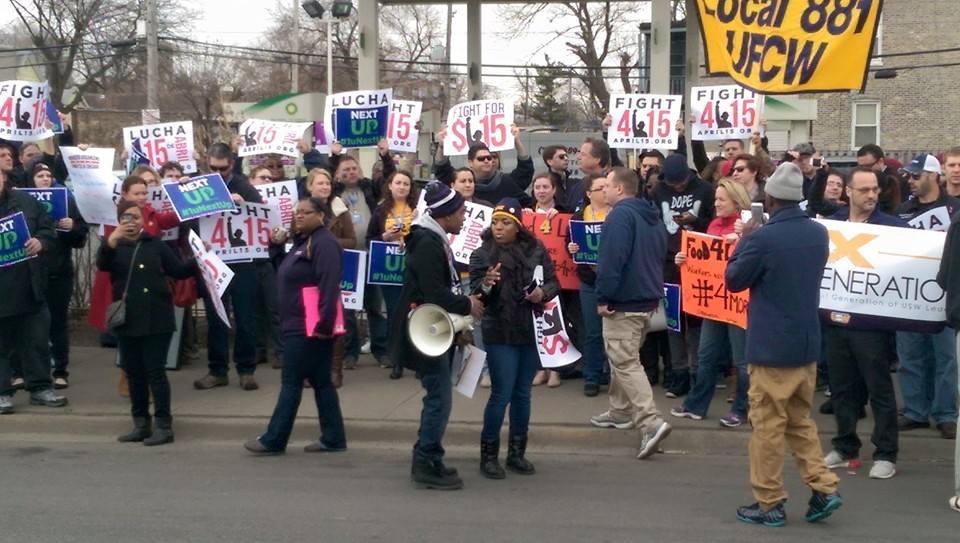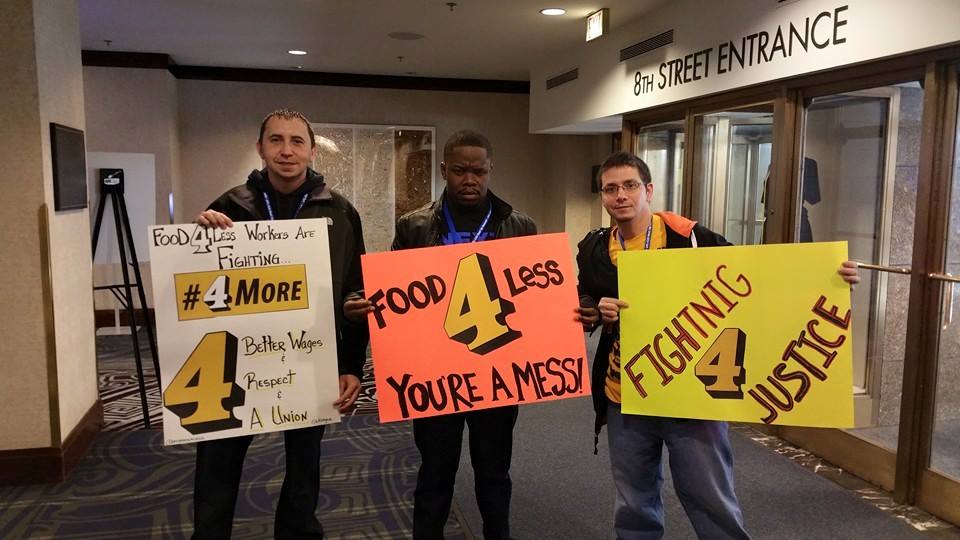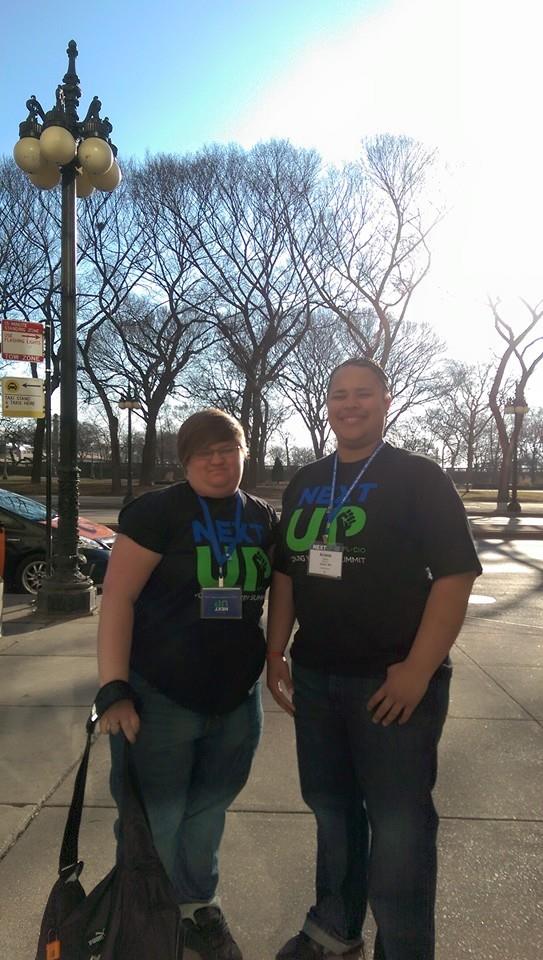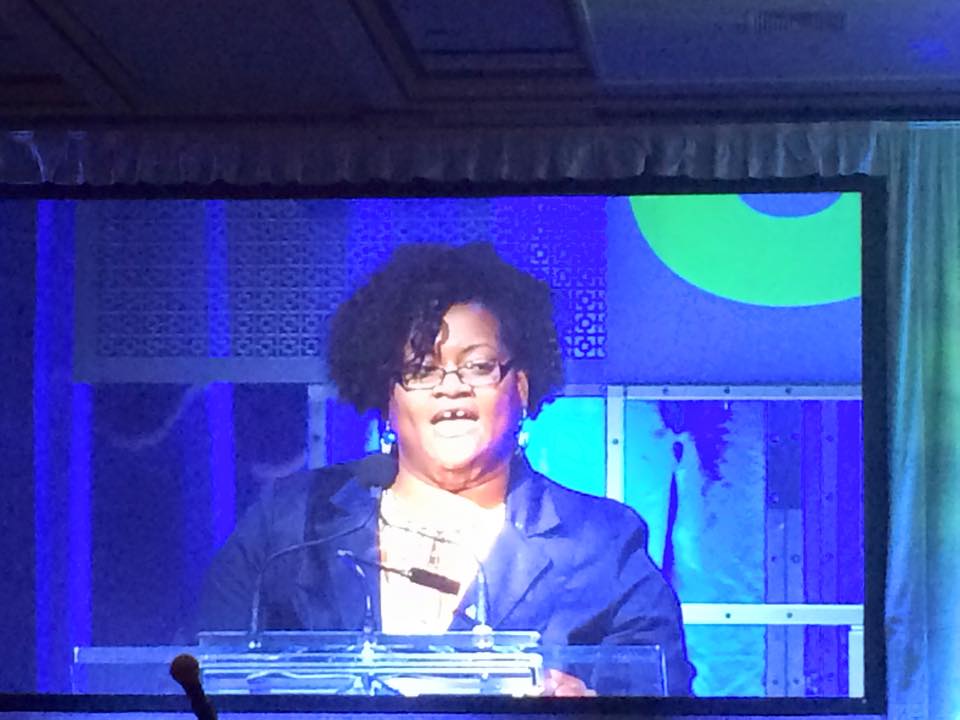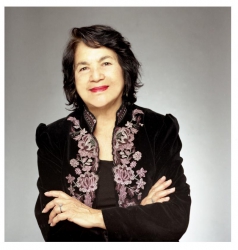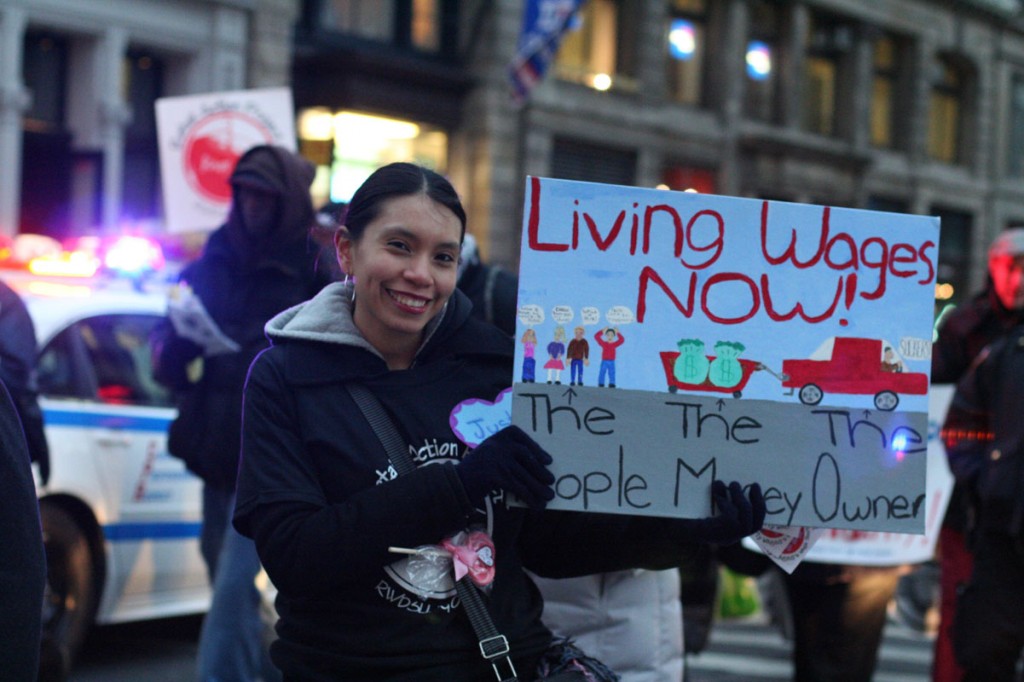April 1, 2015
UFCW Statement on Veto of Legislation Blocking NLRB Election Rule
WASHINGTON, D.C.—The United Food and Commercial Workers International Union (UFCW) today released the following statement after President Obama vetoed legislation that would have blocked the National Labor Relations Board’s (NLRB) rule to streamline union elections.
“As we have said from the very beginning, the NLRB’s modest rule to modernize and streamline union elections is a step in the right direction and should be implemented without delay. Make no mistake, those attempting to block this rule want to make it harder for workers to have a voice on the job. Shortening the period between the filing of a petition and the election means less time for anti-worker employers to intimidate, harass, and fire pro-union employees. This rule creates a fairer process and we look forward to seeing it in action. We commend President Obama for vetoing this ill-advised legislation.”
###
Join the United Food and Commercial Workers International Union (UFCW) online at www.ufcw.org
We are 1.3 million families standing together to build an economy that every hard-working family deserves.
April 1, 2015
UFCW President Perrone in Response to Governor Pence: Fully Repeal Indiana’s Discriminatory Law
 WASHINGTON, D.C.—Marc Perrone, International President of the 1.3 million member United Food and Commercial Workers International Union (UFCW), called for a full repeal of the Religious Freedom Restoration Act in response to Indiana Governor Mike Pence’s press conference where he offered to fix the law without providing specifics.
WASHINGTON, D.C.—Marc Perrone, International President of the 1.3 million member United Food and Commercial Workers International Union (UFCW), called for a full repeal of the Religious Freedom Restoration Act in response to Indiana Governor Mike Pence’s press conference where he offered to fix the law without providing specifics.
“This law is not about freedom, it purposely legislates discrimination and division. It is anti-American, anti-family, and anti-worker. It is a law that cruelly targets men and women, and their families, simply because of who they are. It is fundamentally wrong, it does not belong in Indiana or any state in America, and it must be repealed.
To be clear, as we decide where to take our future business—from annual conferences to the UFCW 2018 International Convention—we will not consider Indiana unless it fully repeals this discriminatory law. We urge every union, every American, and every business and employer, large and small, to join with the millions of Americans who have already spoken out against this needless and terrible law.
For the better America we all believe in, this law must be scrapped.”
###
Join the United Food and Commercial Workers International Union (UFCW) online at www.ufcw.org
We are 1.3 million families standing together to build an economy that every hard-working family deserves.
March 24, 2015
UFCW Local 555 Pushes For Paid Sick Leave in Oregon
 More than 50 UFCW Local 555 members went to the Capitol building in Salem last week to convince legislators to pass a paid sick leave law that will cover every worker in Oregon.
More than 50 UFCW Local 555 members went to the Capitol building in Salem last week to convince legislators to pass a paid sick leave law that will cover every worker in Oregon.
“I’m here to help pass a first day paid sick leave law that will benefit every worker in Oregon,” said Jane Killduff, a 17-year member of UFCW Local 555 who works at Albertsons. “It’s important to have paid sick leave on the first day – right now it doesn’t begin until you’ve been out for three days. It’s a major disconnect when the current paid sick leave policy makes it so hard for people who work around food all day to stay home when they’re sick.”
The push for paid sick leave resonates with UFCW members on a personal level. From the checkout lane to the deli, they want customers and the food they buy to be safe and healthy. The issue has inspired many UFCW Local 555 members to lobby for the first time.
“I can’t wait to tell all my coworkers what a blast I had today,” said Justin Dupuis, a five-year UFCW Local 555 member who works at the Safeway distribution center in Portland. “I learned about the legislative process and what it takes to pass good laws. Most of all I just felt like being here was making a difference. Passing paid sick leave for the entire state is going to make Oregon stronger and healthier.”
Over the past few years, members of UFCW Local 555 have helped Oregon’s two largest cities, Portland and Eugene, pass paid sick leave laws. These victories have created momentum. Local 555 members like Ricardo Morales, who works at Safeway in The Dalles, feel like paid sick leave can and should be adopted statewide.
“I’m at lobby day because I believe we can help pass better laws that will give workers better lives,” said Morales. “Our two largest cities have passed paid sick leave, why not the entire state?”
Members who work in Portland, the first place in Oregon to adopt paid sick leave, were excited to share their experience with legislators who were on the fence.
“I was inspired to be here today to help pass paid sick leave,” said UFCW Local 555 member Amber Hamilton who works at QFC. “I live in Portland where it already passed and it’s been great. I want every worker in the state to have it. People are a lot happier. When you get sick, it’s nice to know you have the time to recover. I wish more UFCW members would lobby. As the saying goes, the more the better.”
It was difficult to walk down a hallway in the Capitol without seeing a flash of gold. UFCW members quickly realized that their presence was having an impact both inside and outside of meetings.
“Just standing in the hall, people stop by and tell us ‘great gold shirts!” said Ellen Hudson, a UFCW Local 555 member who works at the Oregon City Fred Meyer. “It’s a great form of recognition. I wish every UFCW member would take time to lobby their elected representatives. I don’t feel you have the right to moan and groan and complain if you’re not willing to step out of your comfort zone and do something. I learned a long time ago that if you don’t speak up, you get rolled over. If we can find the courage to speak up, we’ll always be heard.”
March 24, 2015
Young Workers From Across the Country Participate in the AFL-CIO Next Up Young Worker Summit
Last week, over 1,000 young workers and union activists headed to the AFL-CIO Next Up Young Worker Summit in Chicago, eager to share and learn more about how we can work together for economic and social justice.
Over 70 UFCW and RWDSU members were in attendance, including many of the 2014 GOLD internship program participants.
UFCW member and former GOLD intern Erica Clemmons proudly introduced AFL-CIO President Richard Trumka at the conference.
Erica joined the UFCW Local 1059 as a cashier at Kroger, and is now an organizer with Local 881. She also sits on the AFL-CIO’s Young Workers Advisory Council. Erica’s dedication to economic and racial equality has inspired many other young workers.
Erica was also one of the many UFCW and RWDSU activists who led workshops at the conference. Workshops focused on issues such as empowering different minority groups, raising the minimum wage, and gender equality. There were also workshops dedicated to sharing skills and tips for things such as digital organizing and collective bargaining.
Attendees of the conference also participated in two local actions to show solidarity for workers fighting for justice. RWDSU hosted an action in support of Guitar Center workers, who have been fighting for a voice on the job. The UFCW hosted another action which began at a local McDonalds, where workers have been calling for a living wage of $15 an hour, and then marched on to a Food 4 Less location. Employees at Food 4 Less have been standing together for better wages and benefits, respect on the job, and union representation. Kroger Company, which owns Food 4 Less, pays its other brand employees more than it does its Food 4 Less workers. Many AFL-CIO affiliated unions joined these actions in solidarity with the workers, in addition to 18 UFCW locals unions.
Read more and watch a clip from the rally here.
Other highlights of the summit included speakers such as Labor ally Danny Glover, who spoke about the importance of activism, and Liz Shuler from the AFL-CIO, who emphasized why young workers are so important to the labor movement.
March 23, 2015
Scott Walker’s “freedom” sham: Legalized bribery, ALEC and an assault on workers
When Governor Walker signed the unfair “right to work” bill into law he proclaimed, “Wisconsin now has the freedom to work.”
When I heard that line, I didn’t know whether to laugh or cry. I wanted to laugh because I knew he was wrong. I wanted to cry because I knew this law was going to make life more challenging for myself, my family, and my friends.
I work at Fair Oaks Farms in Kenosha and am a proud member of United Food and Commercial Workers Union (UFCW) Local 1473. Every few years my coworkers and I sit down with Fair Oaks Farms and negotiate workplace rules, pay raises, health care, and other terms of our employment. There are disagreements, but we have always managed to work out a fair deal.
This “right to work” law upends that entire process by giving corporations all across Wisconsin the right to divide workers. The motivation to undermine worker unity is simple – greed and profits. If the worker side of the bargaining table is weaker, then corporations won’t feel like they have to pay them as much or provide them with as good benefits.
These aren’t just personal fears of mine – they’re facts.
Study after study has shown workers in “right to work” states are poorer, sicker, less likely to have retirement security, and are more reliant upon government programs like food stamps and Medicaid.
That doesn’t sound like freedom to me. That sounds like a fiasco.
Most concerning of all, this “right to work” law was pushed through and bankrolled by an out of state organization called the American Legislative Exchange Council (ALEC).
Here’s how ALEC works. They bring corporations and state legislators together at lavish conferences and wine and dine them to their hearts content. In exchange for being given a ritzy vacation, state legislators are sent home with model legislation that’s written by the corporate attendees.
ALEC wrote the Wisconsin right to work law. It’s legalized bribery.
I understand the value of belonging to a union because I wasn’t always a part of one. My life was pretty tough before I became a UFCW member. I was always finding myself in jobs with an unreliable schedule. As a result, the only thing I could truly rely on was my paycheck being too small. I had no stability, no benefits, and no chance to get ahead.
When I started full time at Fair Oaks Farms almost four years ago I became a member of the UFCW and my life improved dramatically.
I started having a fair schedule that provided me with full-time hours. There was health insurance available for my family that I could actually afford. Before the UFCW I had no insurance at all. I finally started earning enough money that I could start saving for my retirement and my son’s college education.
Most importantly, walking into work every day filled me with pride because I was providing my family with a good life.
When working people are allowed to stick together in their workplace and bargain for better wages and benefits their employer is much more likely to respect their needs. That shouldn’t be too much to ask.
This “right to work” law is an attempt to hurt every worker in Wisconsin. The politicians who helped pass it are stripping us of our stability because their corporate donors want to pay us all less so they can make more profits. It’s shameful and wrong.
Living with this unfair law will not be easy, but if Wisconsin workers stand shoulder to shoulder in their workplaces, we’ll still be able to earn the hours and wages that we deserve.
March 23, 2015
Women’s History Month: Celebrating the Lives of Addie Wyatt and Dolores Huerta
The third week of Women’s History Month gives us an opportunity to pay tribute to Addie Wyatt and Dolores Huerta, two extraordinary women who were shaped by the Great Depression, fought for workers’ rights during the height of the American Feminist Movement, and changed the face of organized labor.
Addie Loraine Cameron, better known as Addie L. Wyatt (1924 –2012), was born in Mississippi and moved to Chicago with her family in 1930. When she was 17 years old, she married Claude S. Wyatt, Jr.
She began working in the meatpacking industry in 1941. Although she applied for a job as a typist for Armour and Company, African American women were barred from holding clerical positions and she was sent to the canning department to pack stew in cans for the army. Due to a contract between Armour and the United Packinghouse Workers of America (UPWA), she earned more working on the packinghouse floor canning stew than she would have made working as a typist, and joined the UPWA after learning that the union did not discriminate against its members.
In 1953, she was elected vice president of UPWA Local 56. In 1954, she became the first woman president of the local, and was soon tapped to serve as an international representative. She held this position through the 1968 merger of UPWA and the Amalgamated Meat Cutters and Butcher Workmen until 1974, when she became director of the newly formed Women’s Affairs Department. In 1970s, she became the first female international vice president in the history of the Amalgamated Meat Cutters and Butcher Workmen and later served as director of its Human Rights and Women’s Affairs and Civil Rights Departments. She served as the first female African American international vice president of the UFCW after Amalgamated and the Retail Clerks International Union merged in 1979.
She and her husband were ordained ministers and founded the Vernon Park Church of God in Chicago. She played an integral role in the civil rights movement, and joined Dr. Martin Luther King, Jr. in major civil rights marches, including the March on Washington, the march from Selma to Montgomery, Alabama, and the demonstration in Chicago. She was one of the founders of the Coalition of Labor Union Women, the country’s only national organization for union women. She was also a founding member of the Coalition of Black Trade Unionists and the National Organization of Women.
In 1984, Addie Wyatt retired from the labor movement as one of its highest ranked and most prominent African American and female officials. In honor of her work, she was named one of Time magazine′s Women of the Year in 1975, and one of Ebony magazine′s 100 most influential black Americans from 1980 to 1984. The Coalition of Black Trade Unionists established the Addie L. Wyatt Award in 1987. She was inducted into the Department of Labor’s Hall of Honor in 2012.
Dolores Clara Fernandez, better known as Dolores Huerta, was born in 1930 in New Mexico, and grew up in the farming community of Stockton, California. She earned a teaching degree at Delta Community College. During that time, she met her first husband. She later married Ventura Huerta. In the early 1950s, she worked as an elementary school teacher, and many of her students were the children of farm workers who were living in poverty. Teaching the children of farm workers had a profound impact on her, and in 1955, she became one of the founders of the Stockton chapter of the Community Services Organization (CSO), which worked to improve social and economic conditions for farm workers and fight discrimination. Through her work at the CSO, she met Cesar Chavez.
In 1960, she helped create the Agricultural Worker’s Association (AWA), and in 1962, she and Chavez launched the National Farm Workers Association (NFWA), the predecessor to the United Farm Workers Union (UFW).
In 1965, she helped to organize the historic Delano Grape Strike and consumer boycott against growers of table grapes in California. The strike involved thousands of grape workers and was a significant victory for the UFW—leading to a first contract with these growers. In 1967, the NFWA combined with the AWA to create the United Farm Workers Organizing Committee. During this time, she negotiated contracts for workers, fought against the use of harmful pesticides, and advocated for unemployment and healthcare benefits for agricultural workers. In 1973, she led another successful consumer boycott against California grape growers that resulted in the California Agricultural Labor Relations Act of 1975, which allowed farm workers to form unions and bargain for better wages and working conditions.
Dolores Huerta stepped down from her position at the UFW in 1999, and established a foundation where she continues her work to improve the lives of workers, immigrants and women. She has received many honors for her activism, including the Presidential Medal of Freedom in 2012.
To learn more about Dolores Huerta, follow her on Twitter (@DoloresHuerta) or visit her foundation’s website at http://doloreshuerta.org/.
March 19, 2015
Statement from UFCW International President Marc Perrone on News of Target Wage Increase
Every Retail Worker has the Right to a Decent Living, a Reliable Schedule, Quality Affordable Health Care, and Respect on the Job
WASHINGTON, D.C.—Marc Perrone, International President of the United Food and Commercial Workers International Union (UFCW), today released the following statement about the news reports on Target’s wage increase and the collective gains secured by workers in the retail industry.
“A higher hourly wage for the hard-working men and women in retail is a first step in the right direction. For far too long, our UFCW family and those outside our family who deserve a better life have been fighting for more than just higher wages. We are fighting for good benefits, a safe and just workplace, and fair scheduling that allows all workers the hard-earned right to support themselves and their family.
“While the struggle against irresponsible companies continues, I believe the momentum is growing. Bad employers who put their bottom line before the people who work to make these companies succeed must change. These families deserve better. While steps forward are positive, we will not stop our fight to raise standards, provide more hours, stable scheduling, and good jobs for all of our family.”
###
The United Food and Commercial Workers International Union (UFCW) represents more than 1.3 million workers, primarily in the retail and meatpacking, food processing and poultry industries. The UFCW protects the rights of workers and strengthens America’s middle class by fighting for health care reform, living wages, retirement security, safe working conditions and the right to unionize so that working men and women and their families can realize the American Dream. For more information about the UFCW’s effort to protect workers’ rights and strengthen America’s middle class, visit www.ufcw.org, or join our online community at www.facebook.com/UFCWinternational and www.twitter.com/ufcw.
March 19, 2015
Local 400 Member Detective Tom Pyles of the Annapolis Police Department Is Making an Impact in More Ways Than One
This is a cross-post from Local 400
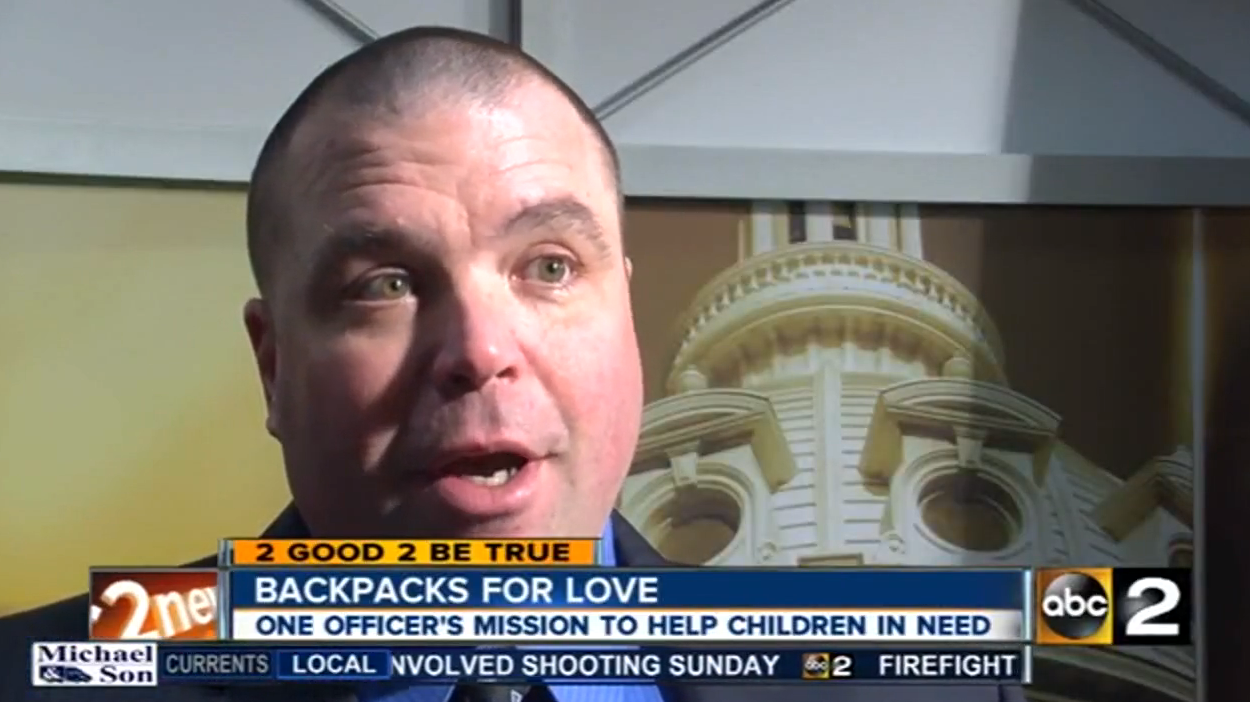 Detective Tom Pyles used to be a DJ at a local Annapolis, Maryland radio station, but left the broadcast industry for the badge at the age of 30 and hasn’t looked back. He’s always wanted to help people in his community, and boy, is he ever! In addition to his duties on the force, he’s collecting supplies to put in backpacks for foster children going into emergency care, something he’s called, “Backpacks for Love.”
Detective Tom Pyles used to be a DJ at a local Annapolis, Maryland radio station, but left the broadcast industry for the badge at the age of 30 and hasn’t looked back. He’s always wanted to help people in his community, and boy, is he ever! In addition to his duties on the force, he’s collecting supplies to put in backpacks for foster children going into emergency care, something he’s called, “Backpacks for Love.”
“Unfortunately you see children who are abused and neglected–they need hope, they need dignity.” Pyles told ABC 2 in an interview. “So as they’re removed from a home, you try to give them that.”
Pyles explained that the reaction the children get when opening the backpacks is “ten times greater than opening a Christmas present—the way they react to them.”
Check out this great video profile of Local 400 member Detective Tom Pyles of the Annapolis Police Department. Our members do great things at work and in their communities.
March 18, 2015
UFCW Immigration Workshop Helps Local 75 Member Achieve Dream of Citizenship
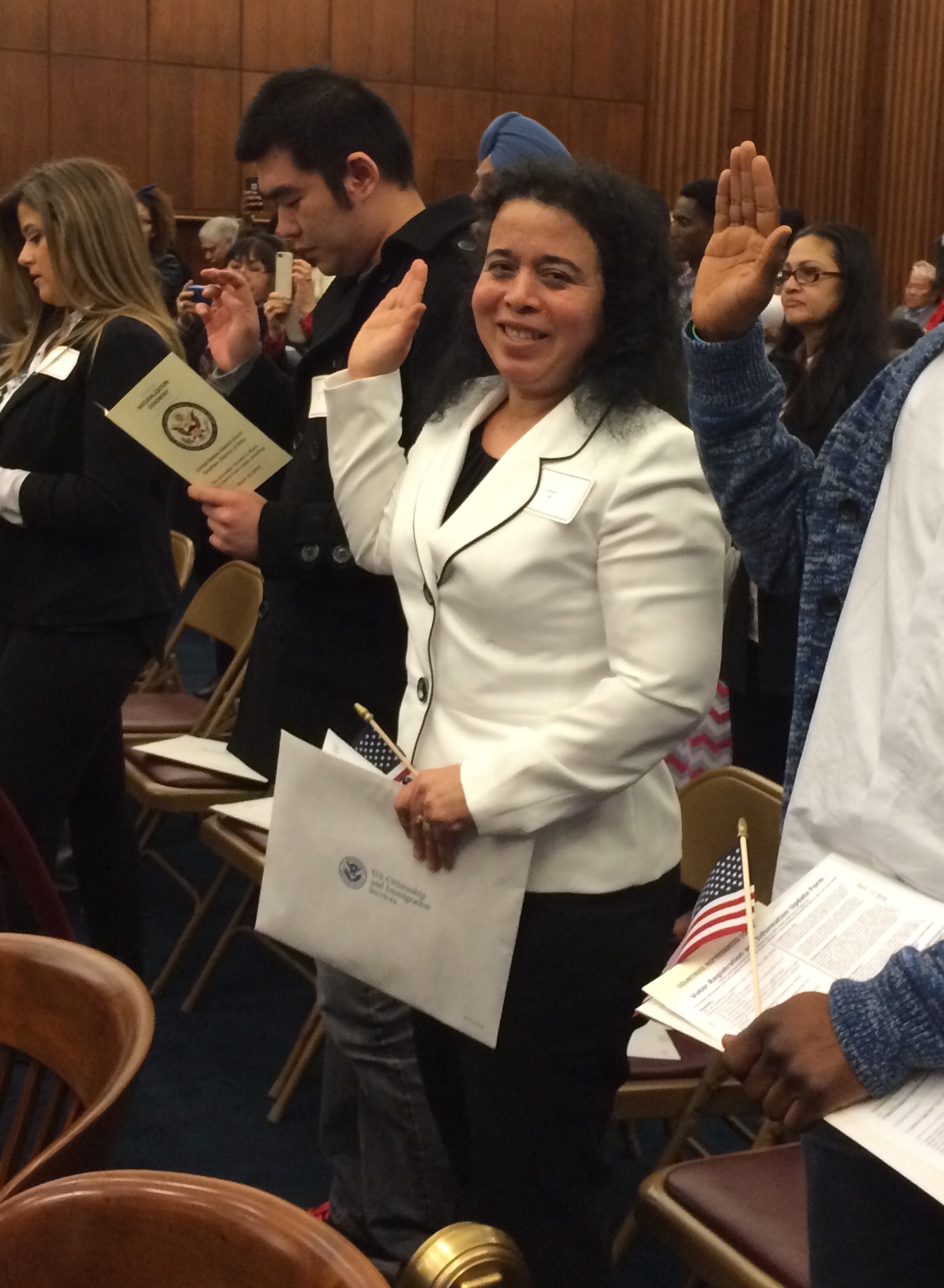 Ernestina Aldana has been a UFCW Local 75 member since she started working at the John Morrell meat processing plant in Cincinnati in 1996. She moved to the U.S. from Guatemala with her husband and son in 1990. The family left Guatemala in search of opportunity and a better life. Ernestina and her husband, who also works at John Morrell, now have three children, the oldest of whom is in college.
Ernestina Aldana has been a UFCW Local 75 member since she started working at the John Morrell meat processing plant in Cincinnati in 1996. She moved to the U.S. from Guatemala with her husband and son in 1990. The family left Guatemala in search of opportunity and a better life. Ernestina and her husband, who also works at John Morrell, now have three children, the oldest of whom is in college.
“I wanted to become a United States citizen so that I could live and work with freedom and without fear. I wanted my children to have opportunities,” says Ernestina. “But it was the union that motivated me to finally do it.”
Ernestina attended Local 75’s first citizenship clinic on November 8, 2014. With the help of union and community volunteers, she completed her application that same day. On Friday, March 13, Ernestina took her oath of citizenship, along with two other UFCW members, at the federal courthouse in Cincinnati, Ohio.
A 19-year member of UFCW Local 75, Ernestina says union membership has meant more to her than higher wages and job security: “Being a union member gave me hope for the future. Having hope got me here today.”
March 16, 2015
Women’s History Month: The Fight for Maternity Leave and Fair Treatment for Pregnant Workers Continues
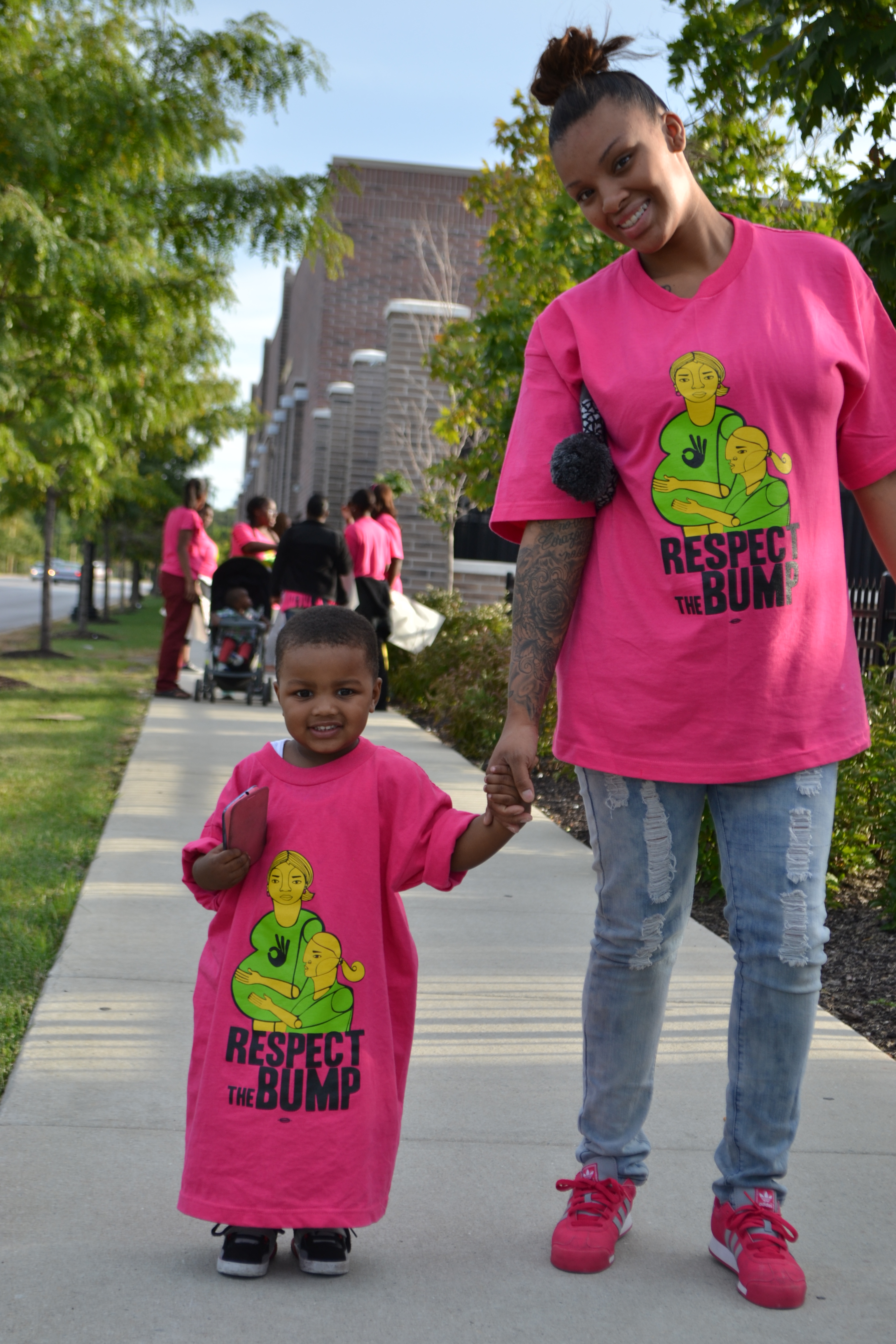 Did you know that the U.S. is the only industrialized country that doesn’t mandate maternity leave? The rest of North America, most of South America, Russia and Europe, Australia and some African an Asian countries all mandate both maternity AND paternity leave, but in the U.S., leave isn’t guaranteed by law for either parent.
Did you know that the U.S. is the only industrialized country that doesn’t mandate maternity leave? The rest of North America, most of South America, Russia and Europe, Australia and some African an Asian countries all mandate both maternity AND paternity leave, but in the U.S., leave isn’t guaranteed by law for either parent.
Only nine countries don’t have laws that guarantee some paid leave for new mothers: the Marshall Islands, Micronesia, Nauru, Niue, Palau, Papua New Guinea, Suriname, Tonga — and the United States. It’s 2015. How is this possible?
Although there have been many improvements in labor conditions for women in recent years, paid maternity leave is unattainable for countless women working in the United States.
But many progressive organizations, worker groups, and unions like the UFCW are fighting to change that.
In a recent status report on the well-being of women world-wide, the Clinton Foundation noted that “paid maternal leave supports women’s continued employment, job stability, and longer-term wage growth.”
Jessica Milli, a senior research associate at the Institute for Women’s Policy Research (IWPR) has also noted that “women still take on a disproportionate part of the care burden and have to take more time off. This has huge implications for their earnings, and their overall experience in the workplace.”
Thanks to worker activism, some employers are seeing the value in providing more paid maternity leave for their female employees, and are realizing that they are far more likely to retain their staff by doing so.
Recently, telecom company Vodafone announced that it will start giving full pay for the first 16 weeks of maternity leave for women and 100% of salary for a 30-hour week for the first six months after their return to work, making the company one of the first multinationals to introduce a worldwide minimum level of maternity pay.
Not only is this a significant help to women at the company, but Vodafone also revealed research that showed global businesses worldwide could save $19 billion a year by providing 16 weeks of fully paid maternity leave.
The analysis found that recruiting and training new employees to replace women who leave the workforce after having a baby costs $47 billion– far higher than the $28 billion cost of the extra benefits.
At Walmart–America’s largest retailer and private employer of women–there is still much work to be done in regards to getting better treatment for pregnant workers. In response to unethical and potentially unlawful treatment of pregnant workers and the widespread financial hardship forced onto working women at Walmart, Walmart moms formed together to create the group Respect the Bump.
Since banding together they have called for Walmart to publicly commit to better pay and protections at the country’s largest employer of women. With the support of the country’s leading women’s rights advocates, the group developed a list of urgent policy changes the company must make to ensure that the women who are helping the company profit are not living in poverty or putting their health at risk.
Thelma Moore, a member of Respect the Bump, was fired for taking time off to ensure her pregnancy was viable after an in-store accident. “Walmart could be paving the way for good jobs for working moms like us,” said Moore. “Instead, we’re fighting for bathroom breaks when we’re pregnant and steady schedules that let us get reliable childcare and put food on the table.”
The mothers of Respect the Bump are still working hard to advocate for better treatment, but in early 2014 their efforts payed off when Walmart quietly overhauled its pregnancy policy to provide basic accommodations for employees experiencing complications with their pregnancies, in a shift that could ease the way for hundreds of thousands of its other female employees who could have babies down the road.
Women’s History Month is the perfect time to reflect on how far women workers have come, but it should also serve as in important reminder that women are still not always treated equally in the workplace. For women, belonging to a union helps ensure a level playing field, protect against gender discrimination, and provides greater benefits than non-union counterparts.


